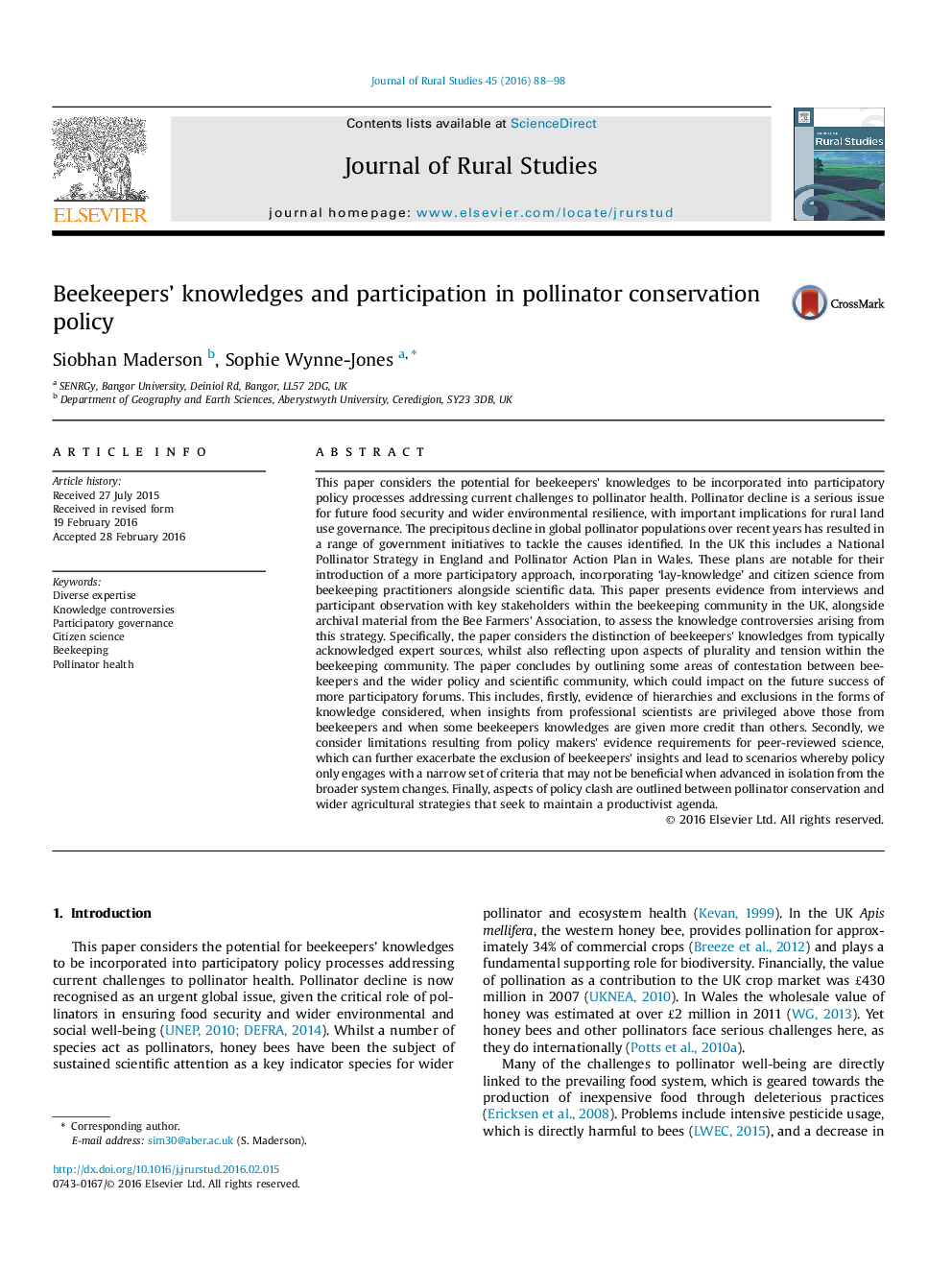| کد مقاله | کد نشریه | سال انتشار | مقاله انگلیسی | نسخه تمام متن |
|---|---|---|---|---|
| 6545406 | 159960 | 2016 | 11 صفحه PDF | دانلود رایگان |
عنوان انگلیسی مقاله ISI
Beekeepers' knowledges and participation in pollinator conservation policy
ترجمه فارسی عنوان
دانش آموزان بوقلمون و مشارکت در حفاظت از گرده افشانی
دانلود مقاله + سفارش ترجمه
دانلود مقاله ISI انگلیسی
رایگان برای ایرانیان
کلمات کلیدی
تخصص متنوع، اختلافات دانش، حکومت مشارکتی، علم شهروند زنبورداری، سلامت گرده افشان
ترجمه چکیده
در این مقاله پتانسیل دانش دانش آموزان بذر را در فرایندهای سیاست مشارکتی مورد توجه قرار می دهد که به چالش های موجود در سلامت گرده افشانی مربوط می شود. کاهش میزان گرده افشان یک مسئله جدی برای امنیت غذایی آینده و انعطاف پذیری بیشتر محیط زیست است و پیامدهای مهمی برای مدیریت زمین های روستایی دارد. کاهش شدید جمعیت های گرده افیلی جهان طی سال های اخیر موجب شد تا تعدادی از ابتکارات دولت برای مقابله با علل شناسایی شده به وجود آید. در انگلستان این شامل یک استراتژی گرده افشانی ملی در انگلستان و برنامه اقدام گرده افشانی در ولز است. این برنامه ها برای معرفی یک رویکرد مشارکتی بیشتر، شامل "علم غلط" و علم شهروندی از متخصصان زنبورداری همراه با اطلاعات علمی قابل توجه است. این مقاله شواهدی از مصاحبه ها و مشاهدات شرکت کنندگان با ذینفعان کلیدی در جامعه زنبورداری در انگلستان، همراه با مواد آرشیو از انجمن کشاورزان زنبورعسل، برای ارزیابی اختلافات علمی ناشی از این استراتژی ارائه می دهد. به ویژه، در این مقاله تمایز دانشمندان زنبورداری از منابع متخصص تأیید شده، و در عین حال منعکس کننده جنبه های تعدد و تنش در جامعه زنبورداری است. این مقاله با مشخص کردن بعضی زمینه های اختلاف بین زنبورداران و سیاست های گسترده و جامعه علمی، که می تواند بر موفقیت های آینده انجمن های مشارکت کننده بیشتر تاثیر بگذارد، نتیجه گیری می شود. این شامل، در ابتدا، شواهد از سلسله مراتب و استثنا در اشکال دانش در نظر گرفته شده، زمانی که بینش از دانشمندان حرفه ای بالاتر از آن ها از زنبورداران و برخی از دانش آموزان زنبورداری اعتبار بیشتری نسبت به دیگران داده می شود. ثانیا محدودیت هایی را که از الزامات مدارک سیاست گذاران برای علم بررسی شده توسط همکاران مورد بررسی قرار می گیرد محدود می کنیم، که می تواند از بین بردن بینش زنبورداران بیشتر شود و منجر به سناریوهایی شود که به موجب آن سیاست تنها با مجموعه ای محدود از معیارها که ممکن است مفید نباشد، انزوا از سیستم گسترده تر تغییر می کند. در نهایت، جنبه های سقوط سیاست بین حفاظت از گرده افشان و استراتژی های گسترده کشاورزی است که به دنبال حفظ دستور کار مولد است.
موضوعات مرتبط
علوم زیستی و بیوفناوری
علوم کشاورزی و بیولوژیک
جنگلداری
چکیده انگلیسی
This paper considers the potential for beekeepers' knowledges to be incorporated into participatory policy processes addressing current challenges to pollinator health. Pollinator decline is a serious issue for future food security and wider environmental resilience, with important implications for rural land use governance. The precipitous decline in global pollinator populations over recent years has resulted in a range of government initiatives to tackle the causes identified. In the UK this includes a National Pollinator Strategy in England and Pollinator Action Plan in Wales. These plans are notable for their introduction of a more participatory approach, incorporating 'lay-knowledge' and citizen science from beekeeping practitioners alongside scientific data. This paper presents evidence from interviews and participant observation with key stakeholders within the beekeeping community in the UK, alongside archival material from the Bee Farmers' Association, to assess the knowledge controversies arising from this strategy. Specifically, the paper considers the distinction of beekeepers' knowledges from typically acknowledged expert sources, whilst also reflecting upon aspects of plurality and tension within the beekeeping community. The paper concludes by outlining some areas of contestation between beekeepers and the wider policy and scientific community, which could impact on the future success of more participatory forums. This includes, firstly, evidence of hierarchies and exclusions in the forms of knowledge considered, when insights from professional scientists are privileged above those from beekeepers and when some beekeepers knowledges are given more credit than others. Secondly, we consider limitations resulting from policy makers' evidence requirements for peer-reviewed science, which can further exacerbate the exclusion of beekeepers' insights and lead to scenarios whereby policy only engages with a narrow set of criteria that may not be beneficial when advanced in isolation from the broader system changes. Finally, aspects of policy clash are outlined between pollinator conservation and wider agricultural strategies that seek to maintain a productivist agenda.
ناشر
Database: Elsevier - ScienceDirect (ساینس دایرکت)
Journal: Journal of Rural Studies - Volume 45, June 2016, Pages 88-98
Journal: Journal of Rural Studies - Volume 45, June 2016, Pages 88-98
نویسندگان
Siobhan Maderson, Sophie Wynne-Jones,
